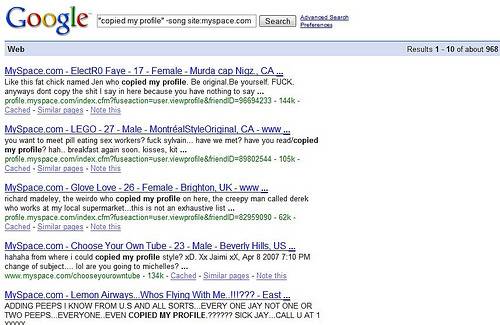The Wall Street Journal put up an interesting article today about profile thieves. These guys don’t want your Social Security number or your bank account information, they just want to be cool. Like you. And they do it by ripping off your social networking profile, word-by-word.

A Common Occurrence?
If you think that this isn’t happening that often, check out the number WSJ is reporting:
“A search on MySpace revealed 700 recent comments that accuse others of stealing headlines, user names, backgrounds, etc.”

I would venture that number is actually much higher, based on a rudimentary search I did myself.
First of all, you have to remove people accusing each other of stealing songs. Your profile song is bound to be used by plenty of other people, especially if it’s a currently popular tune.
Still, my search results (minus the word “song”) come back with 968 results from MySpace alone (2030 leaving song in). The results tend to go something like this: “some (explicative) copied my profile!” If private profiles were searchable, those numbers would likely be even high higher.

The problem extends beyond just social networks, with matchmaking users’ profiles being even more at risk since users at those sites are looking for more than just friends, but something even more elusive: love.

Outsourcing Creativity
The pressure to craft unique online profiles is too much for some.
The business built around the lonely in need of a wordsmith has led to a booming business for online profile writers. Need a better profile? You can visit sites like dating-profile.com, evenamarckatz.com, lookbetteronline.com, e-cyrano.com, and profilehelper.com to name a few.
These sites can write a profile for you or tweak the one you already have to get better results. But, according to the WSJ article, the sites found themselves victims of profile thieves, too. Sample profiles posted on some of these sites have been ripped off and used online.
Maybe the problem is that we all really do like long walks on the beach, after all?

Protecting Your Profile
Besides policing the internet for your own creative words and then begging your copycats to take them down, most users only recourse may be to set their profiles to private, “friends only,” or limited, depending on the social network. Unfortunately, in doing so, the network would lose some of its openness since everyone has to close their doors and watch their backs.
On dating sites, setting profiles to private is not possible or productive since the idea is to keep your profile public for others to find. In those cases, there is nothing much to do but be flattered.
In the end, our best response to these new identity thieves may be to just decide it’s time for a re-write.

















